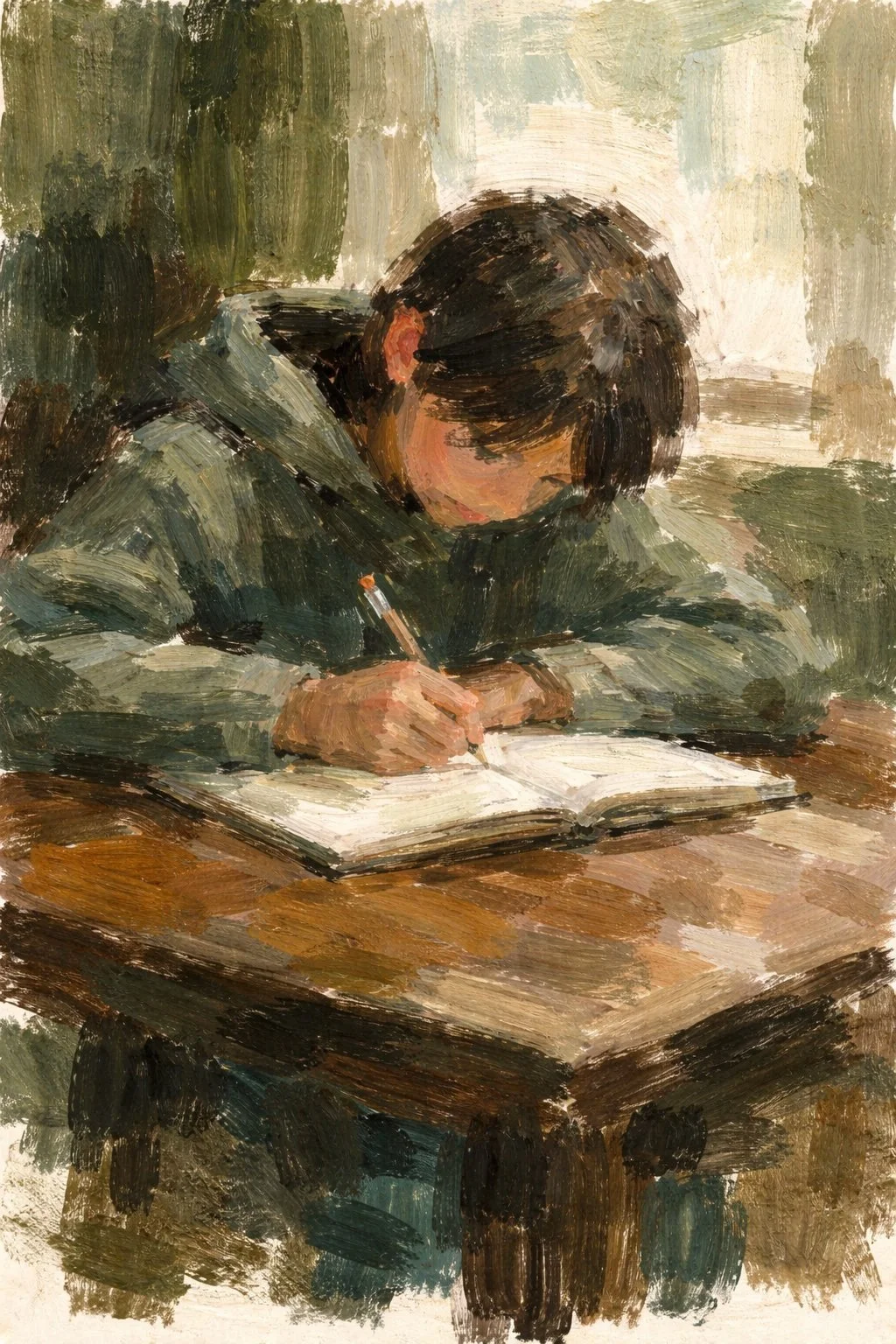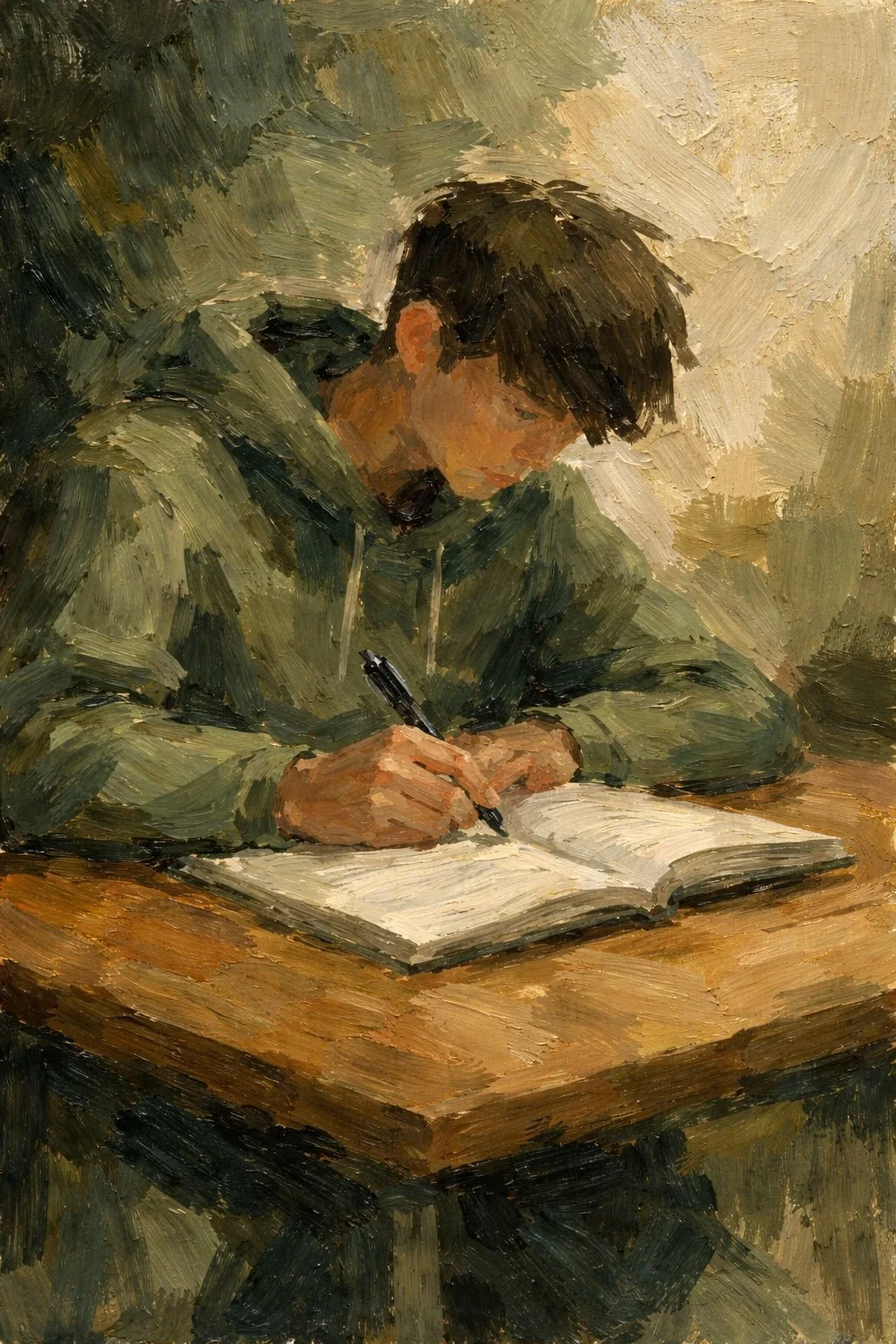Welcome to our informational blog.
Topics covered include literary theory and practice, academic writing techniques, philosophy of education, and explanations of our methods for strengthening creative intelligence.
Teaching Middle School Writers to Tell Their Own Stories
When personal writing is framed as a performance or a confession, students shut down. When it is framed as an act of noticing and shaping experience, they begin to relax into the work. A good writing coach helps students understand that a personal essay does not need to summarize their entire life or deliver a lesson. Instead, it can focus on a single moment, a small memory, or a question that feels important to their life right then.
Temporary Structures: Writing Coaching and Scaffolding
The most valuable outcome of coaching is not a polished draft, but a writer who knows how to approach the next draft alone. When scaffolding is gradually removed, writers learn to trust themselves. They begin to recognize patterns in their own process and anticipate the kinds of support they need. At that point, the writing mentor’s role has succeeded precisely by making itself less necessary.
How Creative Writing Prepares High School Students for College
A creative writing mentor models a way of engaging with language that values risk, patience, and revision as forms of thinking. In one-on-one tutoring, a mentor can help students see that uncertainty is not a flaw in their work but a starting point. Rather than asking whether an essay meets expectations, the mentor asks what the student is trying to understand and how the writing might help them get there.
The Writing Tutor’s Dilemma: On Ethical Revision
The most ethical mentors are those who preserve the integrity of the apprentice’s voice even while pushing it toward greater rigor. In essay tutoring, that same dynamic applies on a smaller scale: a paragraph, a thesis statement, a single line of dialogue. Every micro-intervention carries ethical weight because it alters the path of development.
The Aesthetics of Education: Why Beauty Belongs in Learning
To be educated in literature is to see that beauty, learning, and story are never secondary. For writers—whether students drafting essays or adults working on novels—the aesthetics of education translates directly into the craft of writing. Writing is all about rhythm, tone, and the shaping of experience into form. An online writing coach invites a writer to notice the music of their own sentences, to cultivate their prose as an art of perception as much as persuasion.
Writing Coaching: The Human Touch in the Age of AI
AI is powerful but indiscriminate: it produces text, but it doesn’t know the student. A writing coach, by contrast, sees the individual—their voice, their struggles, their potential. A coach can help a student navigate the temptation to let AI “do the work” and instead show them how to use it responsibly.
The Bard Today: Why We Still Read Shakespeare and How a Writing Coach Can Help
The answer lies both in the continued relevance of his themes, the unparalleled richness of his language, and the psychological depth of his characters. And for those who find the first steps into Shakespeare’s world daunting, writing coach services can provide essential support, helping readers unpack the complexity of his work and discover its resonance in their own lives.
Coaching for Curiosity: Writing Support That Fosters Independent Thinking
Yet the ability to think critically, reflect meaningfully, and express ideas in a nuanced and personal voice is arguably the most vital outcome of any writing education. Writing coaching, when done well, is uniquely equipped to guide students toward this kind of intellectual autonomy. Rather than handing students a formula, a good writing coach helps them ask better questions, take ownership of their ideas, and build the confidence needed to explore their own thinking.
The 650-Word Bildungsroman: How a Writing Coach Helps Students Tell Their Story
One of the lasting gifts of working with an online writing coach on a Common App essay is that students begin to see their lives differently. They learn to ask the same questions writers and readers have always asked: What does this moment reveal about the self? What’s the turning point? What am I still learning?
Writing is Thinking: How Coaching Transforms the Way We Learn
To write well is not only to express oneself clearly. It is to inquire, to probe, to wrestle with ideas, and to remain open to discovery. For students to write this way, they need more than grammar drills and thesis templates. They need time, mentorship, and thoughtful conversation. Writing coaching services demonstrate that writing can be a way of knowing—not just of telling.
Where Are You in Your Writing Journey? How Organic Writing Coaching Moves Beyond the Rubric
An organic writing coaching approach doesn’t replace standards with vagueness. It replaces rigidity with responsiveness and authentic growth. It offers real, practical signposts—not for where students should be, but for how far they’ve already come, and where they want to go next.
What Can’t Be Scored: Voice, Risk, and the Power of Creative Writing Coaching
Creative writing coaching provides an alternative space where experimentation is not penalized but nurtured. A coach does not hand out grades. Instead, they ask questions. They sit with the writing. They consider why a student made a bold narrative choice, rather than assuming it was a mistake.
Restoring the Reading Brain: Coaching Deep Attention in a Fast World
Writing coaches offer something that the algorithm never will: the slow, attentive dialogue of mentorship. In one-on-one coaching, a reader-writer isn’t just told to pay attention—they are guided in how to pay attention.
The Sentence as Ecosystem: Rethinking Grammar as a Living System
Writing consultants can introduce clients to an ecological view of grammar by moving beyond checklists of errors or prescriptive grammar rules. Instead of framing feedback in terms of what is "right" or "wrong," consultants can ask clients to reflect on how their sentences feel and function as systems.
Helping Students Think Like Fact-Checkers: Lateral Reading with an Online Writing Coach
Among the strategies developed to navigate the digital landscape, lateral reading has emerged as one of the most powerful methods for assessing the credibility of online information. While it is primarily discussed in the context of fact-checking and research, lateral reading also holds tremendous value in rhetorical analysis. Moreover, students can benefit significantly from learning this skill with the guidance of an online writing coach who can model the practice, provide feedback, and help students apply it meaningfully in their academic and personal writing.
Reading Literature’s Repressed Histories: Psychoanalytic Marxism and the Writing Consultant’s Role in Literary Analysis
Where Marxist criticism focuses on material conditions and class struggle, and psychoanalysis probes the unconscious mind and repressed desires, Psychoanalytic Marxism asks how these spheres intersect: How do ideological structures shape what we repress? And how does literature register these tensions in the form of narrative, character, and symbolic resolution? For students working through these questions, a writing consultant can offer essential guidance—helping them move from intuitive readings to nuanced, theoretically grounded analyses that illuminate literature’s hidden social work.
Grammar as Inquiry: Constructivist Strategies for Writing Middle School Writing Tutors
Constructivism positions the learner as an active participant in the construction of knowledge, emphasizing contextual understanding, developmental readiness, and collaborative problem-solving. Applied to grammar instruction, this approach enables writing tutors to support middle school students through personalized, reflective, and task-based learning experiences that align with how students actually process and internalize linguistic structures.
Research Readiness: Helping High School Students Find Quality Sources
Introducing students to a range of digital and academic resources, alongside explicit instruction in research techniques, can significantly improve both the quality and efficiency of their work. Writing tutors for high school students play a critical role in this process by providing direct instruction, modeling best practices, and offering targeted feedback to guide students toward more effective research habits.
Graduate School Personal Statements: How Tutors Help Students Meet Higher Expectations
For students accustomed to more general or personal forms of academic self-representation, this shift presents new challenges. Essay writing tutors can help prospective graduate students address these challenges by guiding them through the process of clarifying their goals, developing coherent and relevant narratives, and constructing statements that are both persuasive and aligned with disciplinary and institutional standards.
Point of View in Fiction: Tools for High School Literary Analysis
By studying different points of view—such as first-person, third-person limited, and third-person omniscient—students begin to understand how each form influences the structure and impact of a story. Supporting students in this kind of analysis requires deliberate strategies, especially from high school writing tutors who can help students move beyond basic identification toward more nuanced engagement with the text.





















